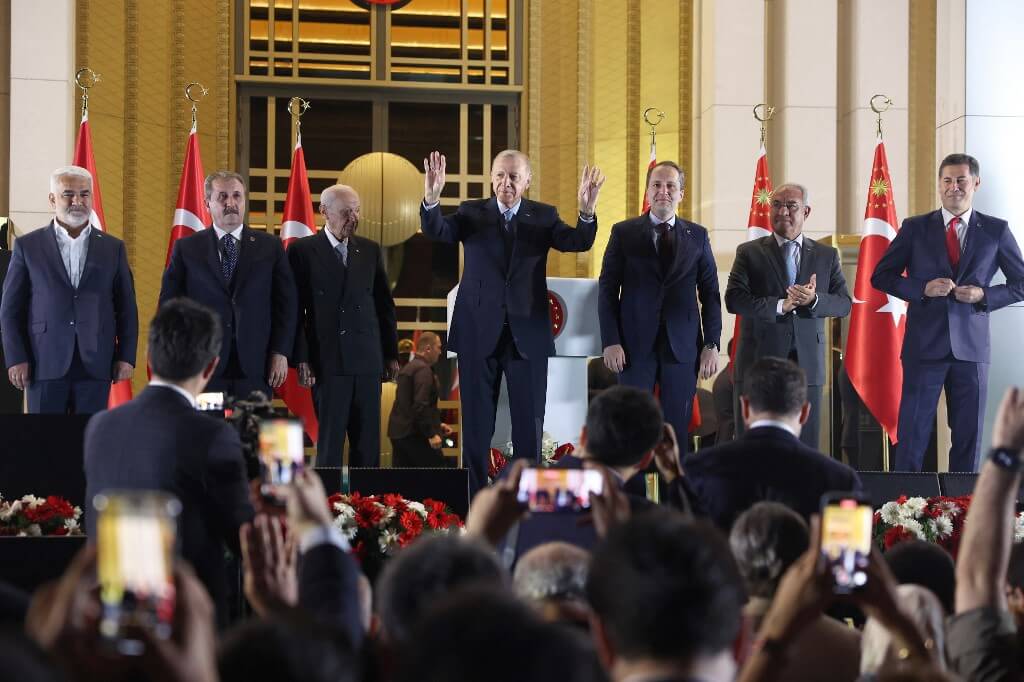Washington-based advocacy organization Freedom House has in its latest report referred to the elections in Turkey last May as “unfair” and said they were held amid suppression of the political opposition and restrictions on freedom of speech.
Freedom House released its “Freedom in the World in 2024. The Mounting Damage of Flawed Elections and Armed Conflict,” report on Thursday in which it found that flawed elections and armed conflict contributed to a decline in political rights and civil liberties, endangering freedom and causing severe human suffering in 2023.
Turkey, which is listed as a “Not Free” country in the report as in the previous reports of the organization since 2018, is listed as one of 52 countries where political rights and civil liberties deteriorated in 2023, with only 21 countries showing improvement.
According to the report, widespread problems with elections, including violence and manipulation, drove a deterioration in rights and freedoms.
Turkey held presidential and parliamentary elections in May. President Recep Tayyip Erdoğan, whose Justice and Development Party (AKP) has been ruling Turkey since 2002, secured a third term in office while the AKP-led People’s Alliance retained a majority of seats in parliament.
Erdoğan garnered 52.2 percent of the vote in the second round, defeating Kemal Kılıçdaroğlu, the then-leader of the main opposition Republican People’s Party (CHP), backed by an alliance of opposition parties.
“Despite the fact that the election had to go to a second round and Erdoğan won only by a narrow margin, attention during and after the campaign was focused on the opposition’s shortcomings rather than the country’s many democratic deficits. Ultimately, the failure of opposition forces to win an unfair contest eclipsed major systemic abuses like restrictions on freedom of expression and the criminal prosecution of political opponents that are commonly employed by the government,” Freedom House said.
Erdoğan’s victory came despite criticism of the government’s response in the aftermath of two major earthquakes that rocked Turkey’s southeastern provinces on February 6, 2023, killing more than 53,000 people and injuring at least 100,000 while leaving hundreds of thousands homeless or displaced.
In addition to the earthquakes, Turkey grappled with a cost-of-living crisis marked by skyrocketing inflation, calculated at around 43.6 percent year-on-year as of April 2023. This economic challenge added to the criticism of Erdoğan’s AKP, which managed to win the elections despite the odds.
The run-up to the elections was not dominated by the talk about the country’s economic problems, the devastation caused by the earthquakes or a recovery plan for the survivors of the earthquakes but Erdoğan’s accusations about Kılıçdaroğlu and the CHP, linking them to terrorism and LGBT+ groups.
Using divisive rhetoric, Erdoğan accused the CHP of supporting the outlawed Kurdistan Workers’ Party (PKK), listed as a terrorist organization by Turkey and much of the international community, and even played a doctored video for his supporters during an election rally in İstanbul showing Kılıçdaroğlu with some PKK members.
Erdoğan later acknowledged that the video was doctored, but the damage had been done.
Freedom House said antidemocratic tactics that target free and fair elections are not always successful in stamping out genuine electoral competition, but long-term manipulation that substantially skews the playing field, particularly by leveraging state resources and media assets, can lead to a situation in which opposition losses reinforce the perceived dominance of an increasingly authoritarian incumbent.
“This is the pattern that has unfolded in Turkey. Turkey’s elections have long featured harassment, arrests, and criminal prosecutions of opposition leaders and journalists, as well as media dominance and abuse of state resources by the ruling Justice and Development Party (AKP),” the report said.
In the run-up to the elections, Turkey also saw the arrest of a number of journalists working for anti-government or pro-Kurdish media outlets, which was interpreted as an attempt by the government to silence its critics. Many said the arrest of the journalists prevented the elections from being held in a free and fair environment.
In the Freedom House report Turkey is listed as the fifth worst country in terms of the greatest decline in freedoms in the past decade, with a minus 27 points from an aggregate score of 100, preceded by Tanzania, Libya, Nagorno-Karabagh (a territory not a country) and Nicaragua.
In addition to the problems of electoral manipulation, the Freedom House report also mentioned Erdoğan’s accusations and attacks against LGBT+ groups as a threat among those affecting specific freedoms — or the freedoms of specific groups — over the course of the year.
The report said Erdoğan blamed LGBT+ communities for the erosion of “the institution of the family,” while his party has proposed legally codifying the definition of family as a unit centered on a man and a woman.
Although homosexuality has been legal throughout modern Turkey’s history, gay people regularly face harassment and abuse.
In recent years, LGBTQ events have been blocked including İstanbul Pride, which was banned in 2015 after taking place every year since 2003.
Officials from the ruling AKP and President Erdoğan frequently engage in hateful rhetoric targeting the LGBTQ community, describing them as “freaks” and “degenerates.”
